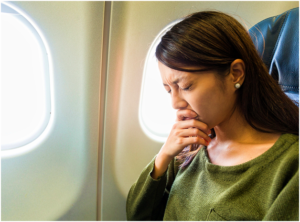Flying After Surgery: What You Need to Know About Air Travel and Recovery

Flying after surgery can be daunting, but with the right knowledge and precautions, it’s possible to travel safely. Whether you’re recovering from knee surgery, a hip replacement, or a major medical procedure, it’s essential to understand how air travel can affect your recovery and what steps you can take to minimize risks.
This guide covers everything from post-surgery travel precautions to tips for managing symptoms in-flight and ensuring a smooth journey.
How Long to Wait Before Flying After Surgery?
One of the most common questions people ask is, “Can I fly after surgery?” The answer depends on the type of procedure, your recovery progress, and your doctor’s advice. Here’s a general timeline:
Flying after knee surgery: Wait at least 2–4 weeks to reduce the risk of complications like blood clots.
Air travel after hip replacement: Allow at least four weeks of recovery, but consult your doctor for individual recommendations.
Flying after abdominal surgery: Recovery times vary, but most people need at least one to two weeks before air travel.
Travel advice after major surgery: For cardiac or other complex procedures, your doctor may recommend waiting several months.
Always consult your healthcare provider for personalized advice. They can provide medical clearance and recommendations tailored to your needs.
Risks of Flying After Surgery
Air travel introduces unique challenges that can affect your recovery, including:
Deep Vein Thrombosis (DVT): Prolonged sitting increases the risk of blood clots, particularly after orthopedic or major surgeries.
Wound Healing Issues: Changes in cabin pressure can slow healing or cause discomfort around surgical sites.
Infections: The risk of infection can be higher in crowded airport environments.
Dehydration and Fatigue: The dry air in airplane cabins can exacerbate symptoms and delay recovery.
Understanding these risks and taking post-surgery travel precautions is key to staying safe during your flight.
Safe Flying After Surgery: Precautions to Take
If you’re planning to fly after surgery, follow these steps for a safer and more comfortable experience:
- Consult Your Doctor
Your doctor’s approval is crucial. They can provide specific advice, such as how to manage medications or address potential complications like DVT.
- Wear Compression Stockings
Compression stockings improve blood circulation and reduce the risk of blood clots. This is especially important for flying after knee surgery or other orthopedic procedures.
- Stay Mobile
Move around the cabin every hour or perform seated leg exercises to promote blood flow. This is particularly important for air travel after hip replacement or abdominal surgeries.
- Pack a Travel Kit
Include medications, such as pain relievers, antibiotics, or wound dressings, and any additional items recommended by your doctor. If you’re traveling internationally, be prepared with local solutions like fever medicine in Italy.
- Stay Hydrated
Dehydration can worsen recovery symptoms, so drink plenty of water before, during, and after your flight.
- Avoid Heavy Lifting
Avoid lifting luggage to prevent strain on surgical areas. Use lightweight bags and ask for assistance when needed.
Managing Discomfort During Air Travel
Pain and discomfort can make air travel challenging after surgery. Here’s how to manage these issues effectively:
Take Prescribed Medications: Follow your doctor’s instructions regarding painkillers or anti-inflammatory drugs. If you need additional medication, fever medicine in Italy or local pharmacies can provide assistance.
Adjust Your Seat: Use lumbar support or a travel pillow to improve comfort. Recline your seat slightly if it alleviates pain.
Use Ice Packs or Heat Pads: Depending on your surgery, applying cold or heat can relieve pain and swelling.
Flying After Specific Surgeries
Flying After Knee Surgery
Recovering from knee surgery often involves swelling and stiffness, which can worsen during air travel. Wear compression stockings, and stay as mobile as possible during the flight.
Air Travel After Hip Replacement
After a hip replacement, avoid sitting for long periods without moving. Plan for aisle seats to make it easier to stretch or walk.
Flying After Abdominal Surgery
Abdominal surgeries often cause bloating or discomfort due to cabin pressure changes. Eat light before your flight and carry medications for nausea or pain relief.
Travel Advice After Major Surgery
Major surgeries, such as cardiac or spinal procedures, require extra care. Always follow your doctor’s post-surgery travel precautions, and don’t hesitate to seek medical help during your journey if needed.
How Flying Affects Recovery?
Airplane cabins are pressurized to mimic altitudes of 6,000–8,000 feet, which can:
- Increase swelling and discomfort around surgical sites.
- Slow the healing process due to lower oxygen levels.
- Exacerbate symptoms like dizziness or fatigue.
Taking proactive measures, such as wearing loose clothing and staying hydrated, can help counteract these effects.
Air Travel Recovery Tips Post-Surgery
Once you’ve landed, continue to prioritize your recovery:
Rest and Recover: Allow time for your body to adjust after the flight.
Monitor for Symptoms: Watch for signs of complications, such as swelling, fever, or shortness of breath.
Follow Your Treatment Plan: Stick to your doctor’s instructions, including medication schedules and activity restrictions.
If you’re traveling internationally, services like ReadyHelp can connect you with English-speaking doctors for online consultations and prescriptions. Whether you need advice or fever medicine in Italy, these services ensure you have access to care wherever you are.
Is It Safe to Fly After Surgery?
Many people wonder, “Can I fly after surgery? Safety guidelines suggest that air travel can be safe with proper precautions. Following your doctor’s recommendations and taking steps to manage risks, such as avoiding heavy lifting and staying hydrated, will improve your chances of a smooth recovery.
Conclusion
Flying after surgery requires careful planning and attention to detail. By understanding the risks and following post-surgery travel precautions, you can travel safely while prioritizing your recovery. Whether it’s flying after knee surgery, air travel after hip replacement, or flying after abdominal surgery, consulting your doctor and taking proactive measures are essential.
Don’t forget to pack essentials like fever medicine in Italy or other medications, and consider using services like ReadyHelp for convenient medical support during your journey. With the right approach, you can enjoy air travel without compromising your health or recovery.
Recommended Articles
Looking for other information about healthy living in your area? Our blog has information about healthful habits, nutritious foods and hospitals or late-night pharmacies near you!
-
Who Needs a Tetanus Vaccine and When?Read More
If you’re traveling in Italy and find yourself in need of a tetanus shot, knowing where to go and what to expect is essential. Whether you’re dealing with a cut, looking for a booster, or simply staying up to date with your vaccinations, this guide answers all your questions about tetanus vaccination clinics in Rome, […]
-
Top Triggers for Perioral Dermatitis and Effective Treatment OptionsRead More
Perioral dermatitis is a frustrating skin condition that often appears as a rash around the mouth, nose, or eyes. If you’re traveling in Italy and struggling with this condition, understanding its triggers and treatment options can help you manage it effectively. This article discusses what triggers perioral dermatitis, what to avoid, and how to treat […]
-
 Can You Fly With Pneumonia? A Comprehensive Guide for TravelersRead More
Can You Fly With Pneumonia? A Comprehensive Guide for TravelersRead MoreTraveling can be challenging, especially when dealing with health concerns like pneumonia. If you’re planning a trip to Italy or need medical assistance while exploring the country, it’s crucial to understand the risks and precautions associated with flying with pneumonia. This article addresses common questions about pneumonia and air travel, outlines potential risks, and provides […]
-
 Can you fly with vertigo: What You Can Do About It?Read More
Can you fly with vertigo: What You Can Do About It?Read MoreTraveling with vertigo can be a daunting experience. Whether it’s a short business trip or a long-awaited vacation, the idea of flying with dizziness or balance issues can cause anxiety for many. So, can you fly with vertigo? The answer is yes, but it requires some preparation and care. Vertigo can affect people in various […]
-
 Navigating Pregnancy in Italy: What Expecting Mothers Need to KnowRead More
Navigating Pregnancy in Italy: What Expecting Mothers Need to KnowRead MorePregnancy is a life-changing journey, and for expecting mothers in Italy, understanding how the healthcare system works, cultural practices, and available resources is essential. Whether you are a local resident or an expat, knowing what to expect when navigating pregnancy in Italy can make this experience less stressful and more enjoyable. This article will cover […]
-
 Understanding Fever Medicine in Italy: What to Know Before Buying?Read More
Understanding Fever Medicine in Italy: What to Know Before Buying?Read MoreFever is a common symptom that can accompany various illnesses, and having access to effective medicine is essential when dealing with it. For those residing in or traveling to Italy, understanding the options for fever treatment is crucial. This guide explores the types of fever medicine in Italy, how to purchase them, and the cultural […]





